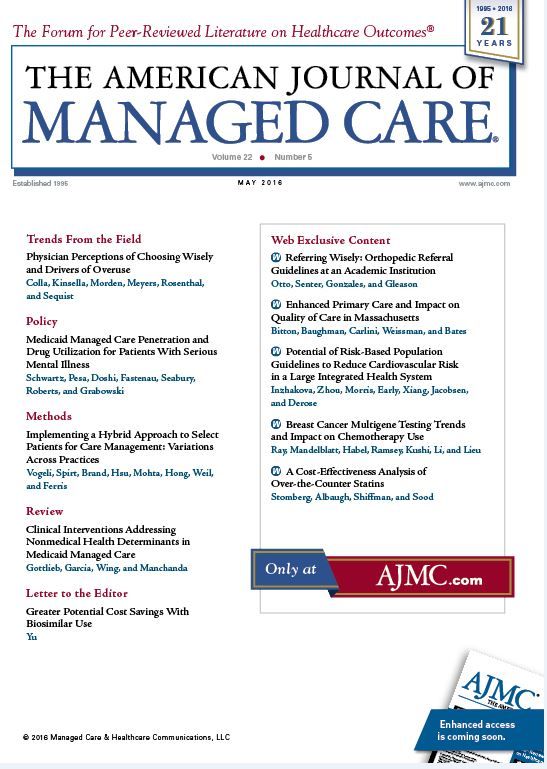- Center on Health Equity & Access
- Clinical
- Health Care Cost
- Health Care Delivery
- Insurance
- Policy
- Technology
- Value-Based Care
Greater Potential Cost Savings With Biosimilar Use
Biosimilars in the United States may demonstrate higher discounts and cost reduction than current estimates.
Am J Manag Care. 2016;22(5):378
Take-Away Points
- Biosimilar manufacturers have utilized aggressive cost reduction measures for their product to capture the biological product market.
- Competitive response has demonstrated cost savings greater than the anticipated 15% to 35% price difference compared with the originator products.
- Competitive response may further decrease biological product costs and improve patient access.
Although biosimilar pricing worldwide has commonly seen cost reductions of 20% to 30% less than the reference products, there are still opportunities for biosimilars to provide more significant discounts. It was stated in an article by Singh and Bagnato, “Clinical and Managed Care Implications of Biosimilars: Evaluating the Science and Challenges to Uptake,” in a recent supplement from The American Journal of Managed Care (December 2015), that payers are realistically set on the notion that the discount biosimilars can provide will be limited to a 15% to 35% of the difference from the originator product.1 There have been increasing instances worldwide that are challenging this view.
One example that demonstrates a more significant biosimilar discount involves the marketing strategy of Remsima, a biosimilar of Remicade (inflixamab). In Norway, Remsima initially offered a 39% discount compared with the reference product on launch. The following year, manufacturers of Remsima took more aggressive measures to capture a higher percentage of market shares through a significant price reduction in their biosimilar. The company offered a 69% discount compared with the reference product, which altered their market uptake from 20% to 30%, to greater than 50% of the overall market for inflixamab.2 With such a notable cost-saving incentive, providers found themselves unable to justify utilizing the originator product over the biosimilar. This example suggests that other manufacturers may take equally aggressive actions to wage price wars and dominate the market. Thus, an increase in competition effectively drives down the overall cost of biological products and presents cost-saving opportunities for payers and healthcare.
As further stated in the supplement article, the anticipated uptake and usage of biosimilars is highly contingent on numerous factors. Anticipated biosimilar cost savings in the United States is conservatively based on frequently reported price differences worldwide, and with the strong and growing biological product market in the United States, there is a likely possibility for fierce competitive response between manufactures that will lead to increased pressure for higher discounts and cost reduction that is higher than current estimates. Payers should continue to monitor the evolving biological product and biosimilar marketplace and broaden expectations for cost savings associated with biosimilar use.
Author Affiliation: Franciscan St. Margaret Health, Hammond, IN.
Source of Funding: None.
Author Disclosures: Dr Yu reports no relationship or financial interest with any entity that would pose a conflict of interest with the subject matter of this article.
Authorship Information: Concept and design; drafting of the manuscript; critical revision of the manuscript for important intellectual content; administrative, technical, or logistic support.
Address correspondence to: Benjamin Yu, PharmD, Franciscan St. Margaret Health, 5454 Hohman Ave, Hammond, IN 46320. E-mail:
Benjamin.Yu@FranciscanAlliance.org.
REFERENCES
1. Singh SC, Bagnato KM. The economic implications of biosimilars. Am J Manag Care. 2015;21(suppl 16):s331-s340.
2. Mack A. Norway, biosimilars in different funding systems. what works? GaBI J. 2015;4(2):90-92.


